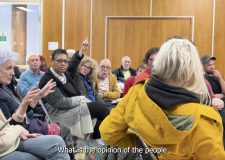Brighton watchdog speaks up for the suicidal
By Nicolas Pierce
Brighton has the second-highest suicide rates in Britain, after Blackpool, according to the most recent official figures.
The suicides are the tip of the iceberg, according to Kerry Dowding, development officer at the watchdog group Brighton and Hove Local Involvement Network (Link).
Many more people have tried to take their own lives. And even more have contemplated the act.
Suicides should not be seen as isolated phenomena, she said, but as “a good indication of the state of community health” more generally.
In a city known for breaking taboos, there appears to be an elephant in the room. And an attempt to tackle it was made by Kerry Dowding in a report for the Link which was published in April.
It found that the National Health Service locally did not always provide the help and compassion that vulnerable patients needed and might expect.
The report criticised the Royal Sussex County Hospital. It said that some patients who went there after self-harming or an attempted suicide had been treated insensitively or had encountered prejudice.
 The Link left posters with day services and mental health charities inviting patients to share their experiences.
The Link left posters with day services and mental health charities inviting patients to share their experiences.
Some 79 per cent of respondents felt that NHS staff had negative attitudes and many felt that those staff lacked the skills needed to deal with mental health patients.
The patients complained of being left alone, sometimes for up to 24 hours, until they could be seen by a psychiatrist.
Some contributors to the report alleged that they had overheard members of staff casually comparing one patient’s self-harm injuries to those of another, causing upset.
Others said that staff would loudly and humiliatingly identify them as self-harmers during handovers.
One patient reported overhearing a doctor instruct nurses to sit a patient with self-harm injuries on a chair, saying: “We don’t give beds to self-harmers.”
Thirteen incidents were recorded of patients feeling unsafe and threatened in A&E.
Two patients harmed themselves in the A&E toilets after becoming frustrated at the treatment that they had received in the department. They left the hospital without being checked by a member of staff.
On an economic level, the report suggests that the NHS’s failure to address these problems could cost more money than if the patients were dealt with properly.
The Royal Sussex and the newly established Brighton and Hove Clinical Commissioning Group are aiming for 15 per cent fewer unscheduled hospital admissions. The performance of A&E is vital if this is to be achieved.
Yet the Link report points out that by making patients with mental health issues feel unwelcome, the Royal Sussex risks further damaging their self-esteem.
And this may lead to repeat admissions and an increased strain on the hospital’s services.
The hospital has published guidelines for assessing and managing patients with mental health problems, including those who self-harm and may be considering suicide.
Its priorities for the current year include a commitment to treating all patients with kindness and compassion.
The Link is not the only organisation raising awareness of this subject in the area. An organisation called Grassroots Training is raising public awareness in Brighton and Hove.
It specialises in suicide prevention courses and consulting with public bodies about mental health policies.
One of the organisation’s core beliefs is that suicide is a community health problem rather than something that should only trouble individuals.
Chris Brown, one of the directors of Grassroots, said that this belief was motivated by a desire to broaden social understanding of the problem.
She said: “We want people to be able to talk directly about suicide without stigma.”
She highlighted the disparity between public acceptance of the importance of physical health training compared with that concerning mental wellbeing.
“Nearly everyone ought to know how to do CPR (cardiopulmonary resuscitation),” she said, “but we’d also like everyone to learn suicide first aid skills.”
She believes that a greater emphasis is given to crisis intervention rather than trying to intervene earlier before a crisis can take place.
She said that the methods of suicide intervention taught by Grassroots were “simple and robust”.
They aim to give concerned friends or family members of those with mental health problems the confidence to talk to them about suicide.
And they aim to spot signs of any “ambivalence” in their feelings about death that might help pull them back from the edge.
Grassroots is a community interest company and hopes to become a charity but said that the process had been delayed by a lack of funds.
Chris Brown said that economic austerity measures were affecting many non-profit organisations and that their training budgets had been cut.
She said that it was increasingly hard to persuade people to donate money. “You mention suicide and people say ‘Nothing to do with me. I don’t want to hear about it,’” she said.
Other awareness raising ventures have had to be postponed by Grassroots during the present uncertainty, including a collaboration with Brighton and Hove Albion.
The aim was to involve first team footballers as a way of reaching young men. It was hoped that by showing that footballers also suffer from depression, young men would be more likely to seek help when they needed it.
Grassroots is planning an event on World Suicide Prevention Day on Monday 10 September at The Latest Music Bar.
The event includes guest speakers such as Kate Bornstein, author of Hello, Cruel World: 101 Alternatives to Suicide for Teens, Freaks and Other Outlaws.
It also includes a video conference with community leaders involved in suicide prevention schemes across the globe.
The elephant may be in the room for the foreseeable future. But efforts to raise awareness of suicide, self-harming and mental health problems mean that, for more people, it’s becoming the subject of a meaningful conversation.





















